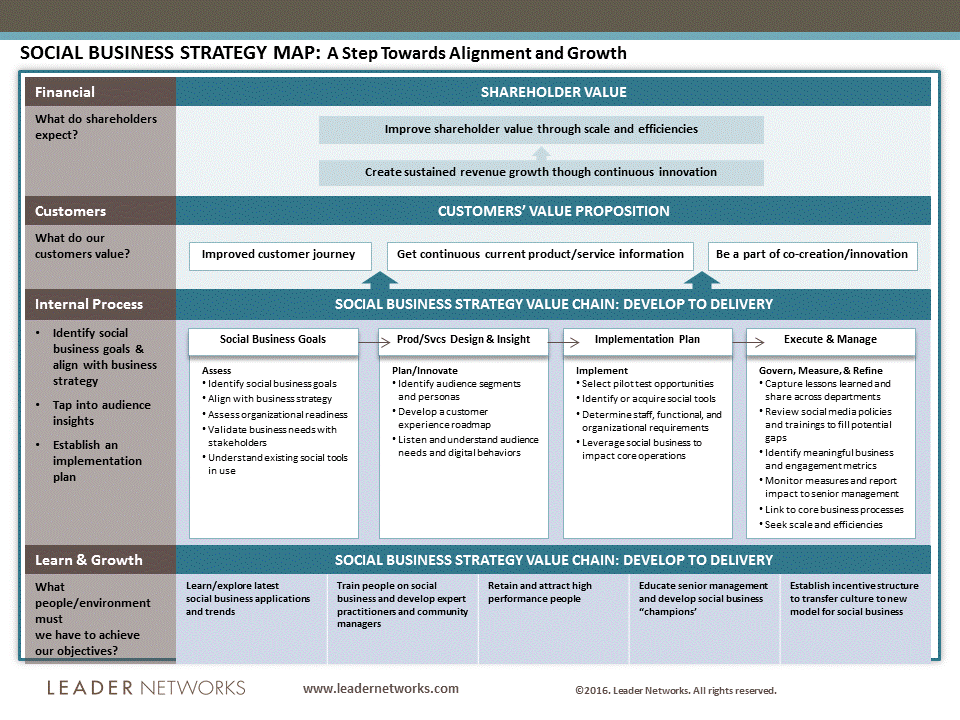 Effective social business strategies connect people, processes and technologies in ways that strengthen a company’s competitive position and increases the value of its brand experience — not to mention the bottom line — with customers, employees, shareholders, partners and other stakeholders. Here are five big strategic wins an effective social business strategy can deliver:
Effective social business strategies connect people, processes and technologies in ways that strengthen a company’s competitive position and increases the value of its brand experience — not to mention the bottom line — with customers, employees, shareholders, partners and other stakeholders. Here are five big strategic wins an effective social business strategy can deliver:
1) Accelerate innovation of products and services.
Great opportunities exist for companies to engage with customers via social media to test concepts, elicit feedback and validate ideas through “collaborative influence.” This is an extremely powerful way to capture insights that can improve existing products or services and identify needs that support innovation and expand business opportunities. This move to social or “collaborative influence” does requires a shift in sales, marketing and development philosophy for most companies.
According to Mohanbir Sawhney of Northwestern’s Kellogg School of Business and co-author of The Global Brain: “Social Customers are driving Innovation, they are empowered and collaborative, they are drivers and initiators of effective innovation and are increasingly viewed as a strategic asset to companies. Today’s customer is looking for a personalized experience and relationship, demanding solutions rather than products.”
Thank goodness for social data and context aware processing on the open Web! It is just a matter of time before all consumers — indeed, all users — have a personalized, controllable digital identity which we can control to specify what information and interactions we want at different points in time. The profiles we create as we use the Web and move through different consumer activities will soon be under our control. This will allow us to choose how businesses can and should interact with us! These social computing applications are already in the market and — perhaps as soon as one or two years — will become the norm. Is your company’s sales and marketing operation ready for this?
2) Strengthen customer loyalty.
A core benefit of social business is the ability to strengthen customer loyalty. To secure customer intimacy and retention, companies must establish and sustain trust and value in the quality, consistency, and reliability of their products and services. Pretty basic, huh?
Once this high trust and value relationship is created, customers will continue to spend money on products and services, and in some cases, spend more in support of your business. These loyal customers will also become brand evangelists — if you treat them right — who act as dedicated buzz agents for your company. All you have to do is please them and they, in many cases, will give back three-fold.
This is a powerful new opportunity created by social media, but it requires a fairly significant re-engineering of the typical customer service organization. This is especially true for product companies. Consider the example of the Arab Spring. Is your organization ready, from a business process perspective, to handle the general public outcry of thousands of unhappy customers?
If your customer service processes are not operating at best practice levels, you already have a problem on your hands. Alternatively, consider how your company could benefit from thousands of loyal, happy customers talking about your products or services on the social Web? Every day, millions of consumers, partners, suppliers and businesses discuss and share their brand experiences – openly. These social collaborators expect the companies they are talking about to be part of the conversation, and to listen, heed and act on customer issues.
For example, companies who use online communities now have an opportunity to open a dialogue at any time in the customer lifecycle — not just at the point of sale — to find out what they like and don’t like about a product or service. Nothing is more dangerous to an organization’s brand or product than dissatisfied customers, who today have a global voice. Yet many organizations may not even be aware of customer issues until they have incurred significant reputation damage or a trending decline in revenue. Ignore those voices at your peril!
3) Increase employee productivity.
Research by The Society for New Communications Research has found many professionals are collaborating more outside of their organizations than within — a result of social media. This is a significant issue for many companies and executives, who may not fully understand or appreciate the value derived through adoption of social media tools and strategies for internal use.
Wise companies will embrace the desire and expectation of collaboration by their employees, and implement social media tools for internal purposes (behind the firewall), which enable greater connections between employees, encourage sharing of practices and experiences, and streamline internal decision-making.
4) Reduce costs by increasing operational efficiency.
Organizations using cloud-based services are becoming better positioned to use only the bandwidth and computing power they need, at the time they need it. This culture of sustainability depends on changes in behaviors. Social media and collaboration already play an important role in shaping the mindset and behavior of individuals concerned about more efficient use of office materials, energy and other business resources.
5) Attract and retain star staff.
The future of business — indeed, of our whole world — lies in the hands of today’s Millennials. Anyone born after 1993 and the rise of the Web thinks and acts differently. They are an essential part of the workforce, bringing a fresh and innovative approach to problem solving. In so many ways, they are different from the Baby Boomers and even the Gen-Yers who dominate leadership in enterprises today. The Millennial expectation of pervasive digital connections means they have a distinct outlook on collaboration enterprises must accommodate to attract and retain them.
To the Millennial, access to the internet and social tools is the norm, a necessity for them to succeed in their work. Increasingly, they expect to access and connect through mobile devices more than actual computers, laptops or other terminal devices. Because they have been educated through the social experience, collaboration tools are a core component of their thinking and work styes. The Web and social collaboration networks have been part of their entire education process. They have come to depend and rely upon social as “always on” and always available to them.
This is the first installment of our series of posts on Social Business Readiness. The complete series is listed below:
The Utility Of Social Business: 5 Strategic Wins
5 Questions for Human Resources
5 Questions for Sales Executives
5 Questions for Legal Counsel
5 Questions for IT Executives
5 Questions for Marketing
5 Questions for Customer Care Executives
How are you using social business to create strategic wins for your organization?
Related Posts
April 18, 2016
Social Selling – Let’s Get a Few Things Straight
The first step to becoming an effective social seller is to understand that…
December 19, 2015
Robin Carey Danced on the Stage of Life
Beautiful. Visionary. Witty. Feminist. Passionate. Loved. Robin Fray Carey…
6 Comments
Add comment Cancel reply
This site uses Akismet to reduce spam. Learn how your comment data is processed.



Vanessa – great piece as we just discussed this today at http://www.executivenetworks.com. Recruiting, Retaining and Developing Talent is critical. Not to mention the need to ensure that organizations are authentic with communications and foster transparency in their internal conversations so that employees feel valued, appreciated and in turn more engaged.
Thanks, Lauren Klein
lklein@executivenetworks.com
thanks Lauren,
and your point about using the internal collaboration channels to strengthen communication. It is often the case that an organization developed a strong business strategy but in unsuccessful in their ability to communicate the strategy to the staff. This is one ways communities can help strengthen strategy performance execution.
Dear Vanessa, thanks for your article focused on probably the most important issues for an organization willing to become a social business.
About the first two points (external issues) don’t you think these wins are more applicable on a B2C mass-market than on a B2B or B2C non-mass market?
Kind regards,
Hi Thomas,
Thanks for your comment.. Good question. In fact I think they are even more important and relevant in a b2b context for two reasons…. The cost of acquiring a new customer is higher so it is even more necessary to driver product and services are match their specific needs. Moreover, as b2b customers are typically expert practitioners, they are usually even more well suited to identify product enhancements and innovations that product development internally as they actually use the product on a regular basis.
What do you think?
Hi Vanessa,
Thanks for your fast and relevant answer about the b2b context.
I think it is perfectly true nowadays when the buyer is the user and the bargaining power of the buyer is higher.
Do you agree?
Vanessa, thank you for your insightful and articulate post. I am running a mobile payment service company and we are in the final stage of development. As such, most of my company’s employees are engineers and programmers. As we are about to pilot test our service with a major online retailer in a few months, we need to hire a marketing team that is also comfortable with SNS. I wholeheartedly agree with your point about attracting and retaining star staff. Any suggestions as to how to hire such talents?